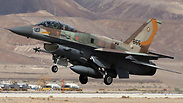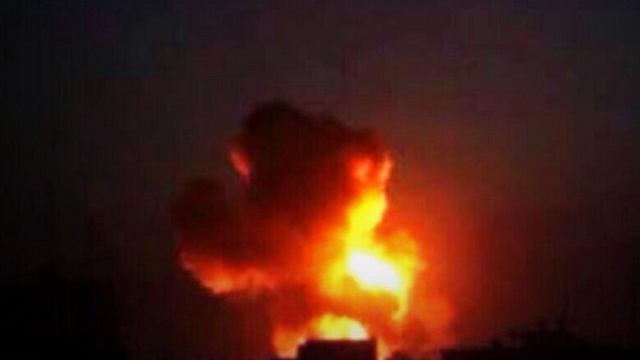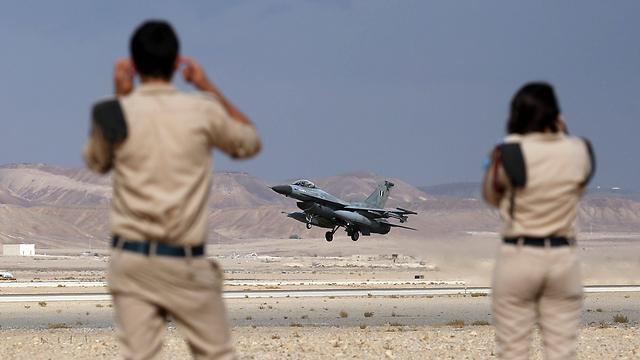
Did someone cross Israel's red line?
Analysis: Despite denials by the Assad regime and Hezbollah, the Syrian Observatory for Human Rights, which reported on an Israeli airstrike in Syria, is considered reliable. As in the past, the reason for this strike could have been due to advanced weapons making their way to Hezbollah. So why aren't the Russians responding?
The Syrian Observatory for Human Rights, which reported Wednesday night on an alleged Israeli strike south of Damascus, is usually a reliable source of information on the subject of Syria. Although the organization is based in London, it has people on the ground all over Syria who are skilled at collecting information, and have been reporting on military and humanitarian activities throughout the five years of the civil war. Therefore, there has been a rush in the international media to highlight the attack which the organization attributes to Israel.
It is well known that Israel has a set policy regarding the northern front, and with it, three red lines.
- Israel will not allow an attack on or within its sovereign territory.
- Israel will not allow the transfer of weapons which will give Hezbollah and Syria a strategic advantage over the IDF.
- Israel will not allow the transfer of chemical weapons to Hezbollah.
Since there was no attack on or within the sovereign territory of Israel, and since Syria's chemical weapons stockpiles have mostly been destroyed, it is safe to assume that if Israel indeed carried out the strike, it was done in order to stop the transfer of advanced strategic weapons systems from Syria to Hezbollah, or from Iran, through Syria, to Hezbollah.
Over the last few years, the Syrians and the Iranians have been trying to transfer two types of weapons systems to Hezbollah. The first are precision ground-to-ground rockets and missiles, with warheads capable of holding hundreds of pounds of TNT, which are specifically designed to target strategic locations in Israel - like the ammonia plant in Haifa which Nasrallah mentioned in his speech.
The second type are surface-to-air missiles that could limit the abilities of the Israeli Air Force's missions in Lebanon and Syria against missiles and rockets that could be used against Israel - if and when. The Air Force's ability to attack high profile targets in large numebrs is essential to prevent destruction and the loss of Israeli life, and it will also prevent the paralysis of essential facilities - such as power stations - during a war with Hezbollah.
It is the Air Force's responsibility to prepare for such scenarios. Hezbollah wants to mitigate this, and it is therefore trying to get its hands on the most advanced surface-to-air missiles it can. These types of systems are manufactured in Russia, and Vladimir Putin has been providing them in abundance - like the SA17 and SA22, which can take down a plane from a range of tens of kilometers, and at different altitudes.
What is most important to note about these SAM systems is that they are very mobile, and they can operate autonomously. These systems are easily camouflaged, and can be put in places that make it difficult for Israeli intelligence to spot. They can also pop up in unexpected places in a short amount of time, thereby making their destruction difficult, and endangering the Israeli Air Force's freedom of operation.
That is why, according to foreign reports, Israel targeted several shipments of these missiles in the past, which Syria bought from the Russians and was sending to Hezbollah. Several older SAM systems, such as the SA-8 surface-to-air missile system, did, however, manage to make their way to Hezbollah.
Recently, Russia deployed S-400 SAM systems to Syria, which are able to shoot down airplanes from a range of more than 100 kilometers, and at different altitutdes. The Russians deployed these batteries to Syria as a threat to Turkey after Ankara shot down one of their planes, but they haven't given these systems to the Syrian army. However, there is still the slight possibility that these missiles will fall into Hezbollah's hands, maybe behind the Russians' backs.
Why didn't Syria intervene?
If the Israeli Air Force did indeed attack south of Damascus, as reported by foreign sources, the question arises as to how is it possible with the Russian Air Force in the area, operating in unison with the regime in Damascus?Russia attacks ground targets in Syria from the air in order to help the Assad regime in its fight against the rebels. As far as we know, the agreements between Russia and Syria and Iran do not include defending Syrian airspace from any kind of infiltration.
It is safe to assume that while the attack was taking place, there were no Russian Air Force jets in the sky in that area. Regardless of the attacks, the Israeli Air Force has the capability, weapons, rockets, missiles, and different types of cruise missiles which can carry out an attack on Syrian territory without the need to enter Syrian air space. "Strikes from afar" are the preferred method of air-to-ground fighting.
In addition to that, there is a coordination mechanism in place between the Russian forces operation in Syria and the IDF. If there was a risk of conflict or collision, this mechanism is supposed to neutralize it.
Between Syria and East Jerusalem
If indeed Israel struck in Syria, then why are the parties involved, such as the Syrian military spokesperson and Hezbollah TV station Al-Manar, denying it happened? The IDF's Spokesman's Office also did not confirm or deny it, and keeps quiet.This silence has become common practice in order to mitigate a conflict which none of the sides are interested in. The "area of denial" gives Syria and Hezbollah the option not to respond. Israel also has no interest in provoking a response from Syria and Hezbollah, and therefore keep quiet as well.
There is another issue worth noting: IDF Chief of Staff Gadi Eisenkot's speech to high school students, in which he said that there soldiers should not empty an entire magazine of bullets into a Palestinian girl attempting to attack someone with scissors. The two examples are talking about using military force, and in the two examples - at least, from what the sound of the IDF chief's comments - the use of force must be done proportionally and professionally.
The Syrian organization alleges that Israel shot three missiles that hit what the Syrians were possibly trying to send to Hezbollah. Three missiles, no more, that have a good chance of getting the job done. That is exactly the reason why the soldier who is standing in front of a teenage Palestinian girl holding scissors doesn’t need to empty a full magazine into her to stop her. It is enough to hit her with the butt of his rifle.
The use of force requires restraint, proportionality, and professionalism, as the IDF allegedly demonstrated in Syria and is supposed to demonstrate in Jerusalem and Ramla.













